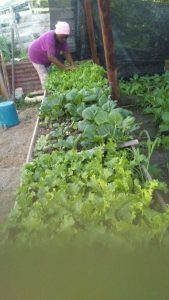IN everything, from colouring books to truck ads, you typically see male farmers, with women more often appearing as “the farmer’s wife.” Fortunately, that’s not the whole truth. Around the world, our food supply depends on the brilliance and determination of women.
Women are powering modern farming in both the developed and the developing world. While it’s true that these females haven’t reached parity yet in every region, the upward trends are outstanding.
In this week’s article, the National Agriculture Research and Extension Institute (NAREI) will over the next few weeks be featuring three women farmers from Linden, Mahaica and West Bank Berbice with each telling their farming experience.
JUNE ANN JOHNSON’S STORY
In the mornings when 62-year-old June Ann Johnson wakes up, the first thing she does is run to her garden in the backyard of her Lot 27 Bennett Dam, Rosignol, West Bank Berbice home, where she would usually spend time with her crops. “I enjoy farming and I go into my garden even before I drink tea.”
According to June Ann, being a parent to seven children can be challenging so she started planting her little kitchen garden decades ago to assist her husband, who was working at the estate at that time. The crops were used to feed her family.

However, when her children got married and moved from their childhood home, her husband left the estate and the couple got into large-scale farming. They planted pepper, pak-choi, ochro and bora and would wholesale and retail to customers.
“We never had a hard time getting market because our neighbours usually buy, and when other persons selling two stems of pak choi for $200 we would sell three stems for $200 so we always had customers,” June Ann said.
For her, farming is something she enjoys and while it can be hard work, the end result is rewarding. “You can never starve with farming, there is always food.”
And, just when the 62-year-old woman started enjoying planting with her husband by her side, the unthinkable happened. He died 18 months ago. “I was devastated but I had to do something to live so I continued with the garden.”
According to the mother of seven, she continued planting her garden and at the end of each crop cycle, she would go out to the market and sell her produce. She takes care of her crops on her own and is now looking to plant banana and plantains.
In late 2018, NAREI provided training to a group of farmers on the benefits of shaded agriculture. June Ann was one of five farmers who were identified and the institute, aided by Food and Agriculture Organisation (FAO) assisted in the construction of five shade houses.
She is currently experimenting with lettuce.



.jpg)








